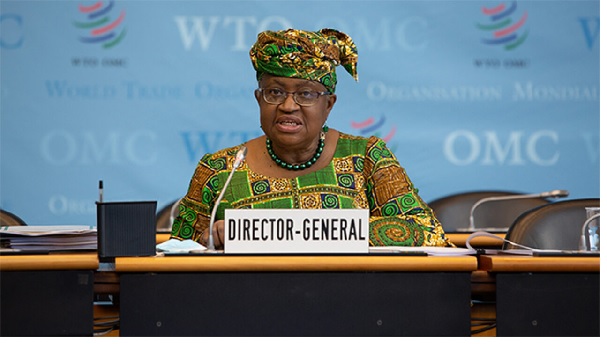Nigeria is one of the 164 member countries of the World Trade Organization (WTO). As the name of this international organization implies, WTO deals with the global rules of trade between nations, to ensure that international trade flows smoothly, predictably, and freely. Just like other members, there are several ways Nigeria can benefit from WTO. Keep on reading as we discuss the 9 benefits Nigeria can get from the WTO.

How Nigeria can benefit from the WTO would be discussed below:
-
Reduce Living Costs and Raise Living Standard
The member countries of the World Trade Organization are bound by agreements, rules, and negotiations which are geared toward making international trade as smooth, predictable and free as possible. One such agreed-upon agreement that the WTO trading system upholds is the lowering of trade barriers among member nations.
As a result of the low trade barriers Nigeria enjoys whilst trading with other member countries of the WTO, it is considerably cheaper to import finished goods and services used by Nigerians (consumers and producers alike) than if such low barriers did not exist. Reduced trade barriers invariably cut living costs and raise the standard of living of Nigerians – to an extent.
-
Strengthening Positions in Trade Disputes
As a member of the WTO, Nigeria is involved with international trade with over 98% of world countries, bringing about benefits as well as increasing the potential for disputes. Before the emergence of the WTO, the history books are littered with serious conflicts that have resulted from trade disputes between countries.
The WTO ensures that members negotiate rules that are acceptable to all. And in events where a WTO member, for example, Nigeria, believes that a fellow member is not playing by the agreed rules, she can turn to the WTO Dispute Settlement Body (DSB).
Regardless of if the trade dispute is between a developing country and one which is developed, disputes can be amicably settled by the WTO DSB without the need for any party to resort to taking actions unilaterally.
-
Stimulation of Economic Growth and Unemployment
Nigeria, as a developing country and member of the WTO, can benefit immensely from the multilateral trading system of the WTO to grow faster and more steadily. For example, export companies in Nigeria posting profits due to the favourable WTO trading system would likely employ more workers while contributing to the GDP.
Also, through the multilateral system of the WTO, companies in Nigeria can access a wider range of higher-quality inputs, technology and know-how to boost their efficiency and productivity. Although companies that become innovative to do more with less may see some workers losing their jobs. This is where effective social programmes of the government should come in to train these workers to find new jobs.
-
Cuts the Cost of Nigeria-based Enterprises Doing Business Internationally
Non-discrimination is one of the key principles of the WTO. As a result, companies in Nigeria (as well as those in other member countries) involved in international trade get to enjoy streamlined trade. Streamlining trade helps companies cut costs and increases productivity, thereby resulting in more jobs and better goods and services.
Other key principles of the WTO, including transparency, increased certainty about trading conditions, simplification and standardization of custom procedure, removal of red tape and all other trade facilitation measures make life simpler for enterprises involved in international trade in Nigeria.
-
Promotion of Good Governance
Since all member countries are expected to be transparent in their trade policies according to the WTO policy, the Nigerian government are better placed to defend the interests of everyone in the economy against lobbying from narrow interest groups. This, therefore, helps reduces arbitrariness and opportunities for corruption in the government. More so, the WTO rules prevent governments of member countries from backsliding into unwise policies after giving their initial commitment to negotiations and policies collectively agreed upon by all WTO members.
-
Facilitates National Development
The WTO multilateral trading system makes Nigeria open to trade with over 160 countries, which in turn, can facilitate development. As suggested by many economists, export diversification -away from reliance on oil- is one of the ways Nigeria can improve its economy.
Furthermore, contained in the WTO agreements are provisions that take into account the interests of developing countries, such as Nigeria. The economy of Nigeria and other developing countries that make up the WTO enjoy measures put in place by the WTO to increase trading opportunities, among other benefits.
-
Gives Nigeria a Stronger Voice in International Trade Negotiations
Before the emergence of the WTO, trade between countries, especially between the powerful and the least powerful countries, was based on the principle of might make right. Then, developing countries lacked bargaining power against the more powerful nations during trade negotiations.
With the WTO, developing countries, like Nigeria, are given a stronger voice, as bargaining power is now narrowed by agreed rules, consensus decision-making, and coalition building. The practice of WTO reaching decisions by consensus means all the members have to be convinced for an agreement to be reached, thereby ensuring all members are bound by such resulting agreements.
-
Supports the Environment & Health
One of the objectives of the Marrakesh Agreement Establishing the WTO is the optimal use of the world’s resources, sustainable development, and environmental protection. Based on the range of provisions of the WTO backing this objective, Nigeria can curb trade to protect human, animal, or plant life, or health, and conserve exhaustible natural resources.
-
Contributes to Peace and Sanity
Since members of WTO are expected to stick to the agreements reached by consensus, it becomes difficult for destructive trade tensions to occur between nations. The WTO achieves this goal of contributing to global peace and sanity by helping trade flow smoothly and providing countries with a constructive and fair outlet for dealing with disputes over trade issues.